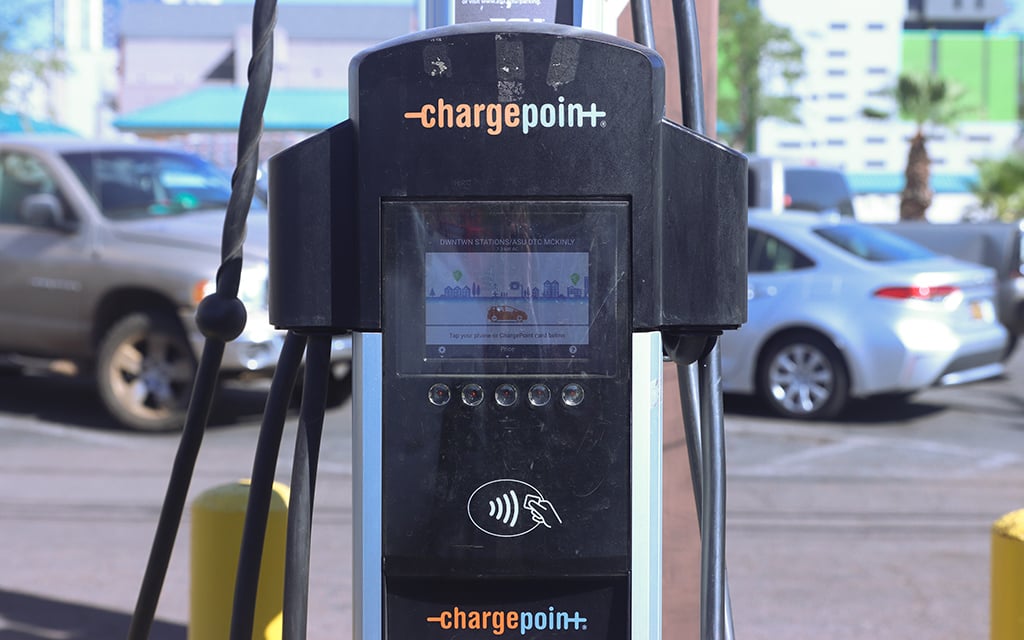WASHINGTON – Electric vehicle sales have increased in Arizona faster than installation of charging stations.
The number of EVs registered in the state has tripled in the last year and a half to 89,798, according to the Department of Energy Alternative Fuels Data Center. California has 1.2 million EVs, the most of any state. Arizona ranks 10th.
State and federal officials are scrambling to make sure the infrastructure catches up.
“As there’s more growth in the EV sector, we’re crossing the threshold where it becomes something that more and more people are considering,” said Tony Manjooran, chief operating officer at BreatheEV, a Phoenix company that sells charging stations for apartment buildings and commercial properties.
“New models of vehicles coming out with full electric or hybrid options are also pushing more people to consider those vehicles,” he said.
The growth has been aided by federal tax credits for buyers: up to $7,500 for new EVs and up to $4,000 for used EVs.
The credits were part of the Inflation Reduction Act of 2022, signed into law by President Joe Biden to wean drivers off fossil fuel, reduce greenhouse gas emissions, and encourage domestic production of EVs, batteries and raw materials used in producing them.
“Those cash incentives … help drive the growth in that sector,” Manjooran said.
But a shortage of charging stations makes some EV drivers wary of taking a long trip through Arizona.
Statewide, Arizona has 1,323 publicly accessible EV charging stations with 3,912 ports, according to October data from the Department of Energy Alternative Fuels Data Center. That’s one station for every 68 registered EVs and one port for every 23 EVs.
There are also 80 private charging stations with 298 ports.
Marc Campbell, assistant vice president for sustainability at Arizona State University, said fear of running out of juice away from home keeps some people from making the jump away from gasoline vehicles.
“The dearth of EV charging stations has been a recognized impediment to increased adoption of electric vehicles in Arizona, particularly given the lower ranges of older electric vehicles and range anxiety,” said Campbell, who has been involved in installation of EV charging stations at ASU and other projects.
Campbell said it will take ongoing public-private collaboration to ensure that Arizona has enough charging stations.
“A full build-out of EV charging infrastructure takes time,” he said.
A homeowner could pay $900 for a 240V Level 2 charger – the kind that can recharge an EV in four to 10 hours – plus up to $600 for installation, according to DOE estimates. For public chargers, the costs are more like $3,500 plus $2,500 for installation.
“The cost is up to sometimes $7,500 per port, which for certain businesses becomes quite expensive,” Manjooran said.
A direct current fast connection – more common in public places and along highways – can recharge an EV in as little as 20 minutes to an hour. These cost $38,000 to $90,000, plus up to $60,000 for installation, according to DOE.
The cost discourages many EV owners from installing a home charging station and could deter some would-be buyers.
In August, the Arizona Department of Transportation announced the first set of awards to design, build and operate a network of 18 fast-charging stations on interstate highways. Each station will have at least four charging ports. They’ll be installed along I-10, I-8, I-40, I-17 and I-19.
Arizona received $76.5 million over five years to build out its EV infrastructure, out of a $5 billion program run by the Federal Highway Administration.
Private developers will provide 20% of the cost and will own and operate the stations located at gas stations, travel centers, restaurants and hotels. The goal is for some to be ready for use by late 2025.
It’s a start, said Manjooran, but Arizona needs more.
“The state should make sure EV owners can access charging stations outside of their homes and ensure they can charge when they most need it,” he said.


